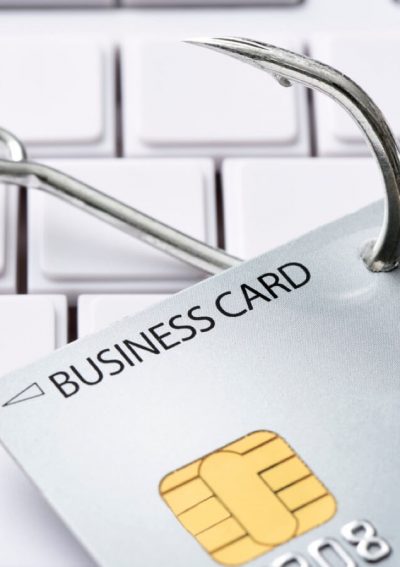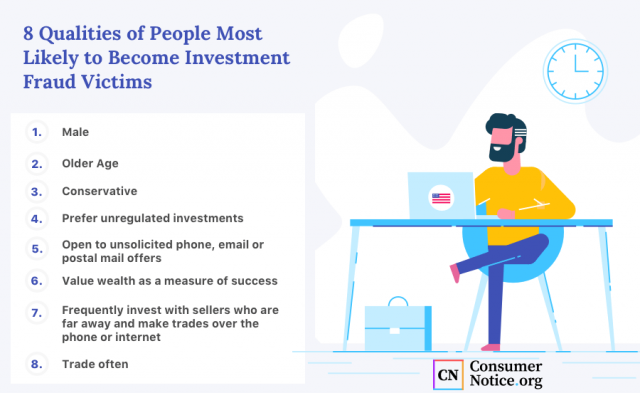Investment Fraud
Investment fraud occurs when a scammer uses false or misleading information to convince an investor to make sale or purchase decisions. The illegal and deceptive practices, such as Ponzi schemes and pyramid schemes, violate securities laws and usually end in losses for the investors.

Nearly 70 percent of United States households own some type of investment, including IRAs and 401(k)s. And one in 10 of those investors will fall victim to investment fraud at some point in their lives, according to a 2016 study from the Pension Research Council at the University of Pennsylvania’s Wharton School.
Investment fraud refers to a wide range of schemes designed to lure victims into risky, fraudulent or even non-existent investments. It can be one of the most expensive types of frauds and scams because it targets people’s savings. It also heaps stress, anxiety, depression and other non-financial costs on its victims.
Scammers can include professional investment advisors as well as people you know and trust in your neighborhood or social circle. The schemes may offer opportunities to buy into low-risk or no-risk investments or unregistered securities. They may include complex strategies and promise guaranteed or constant returns with little or no losses. But in reality, the fraudsters are misleading investors using false information to make money.
Consumers can reduce their risk by knowing how to spot the most common scams and how to report suspected investment fraud.
How to Avoid Becoming a Victim
Scammers can target anyone for investment fraud. But they tend to narrow their search to people most likely to be taken in by their schemes. That often means they’ll prey on groups of people with whom they claim to share something in common. They may target older people who tend to be more trusting and have larger savings tucked away to invest in their schemes.
Some people may be more prone than others to fall for a fraud. But knowing what makes you vulnerable and what to look out for can protect you from losing your money.
Who Is Likely to Become a Victim of Investment Fraud?
AARP painted a well-rounded profile of people most likely to fall victim to investment fraud in 2017.
The advocacy group’s Fraud Watch Network conducted a study to identify personal vulnerabilities that make people susceptible to this particular type of fraud. The study involved asking more than 8,000 confirmed investment fraud victims questions about their psychological mindset, behaviors and demographics, including age, gender, marital status and military service.
The researchers identified eight qualities that put people at higher risk of falling victim.

“If you recognize any of these risk factors in yourself or among those you care about, it would be wise to be on alert whenever the phone rings or an email comes into your inbox offering an amazing new opportunity to pad your 401k account,” the researchers wrote in their conclusion.
How Can You Protect Yourself From Investment Fraud Scammers?
Protecting yourself from investment fraud requires you to be skeptical of investment or other money-making offers. It also requires you to research the company or product you’re asked to invest in.
Watch out for terms like “guaranteed returns” or “everyone is buying it.” And if it sounds too good to be true, it probably is.
10 Tips for Avoiding Investment Fraud
- Be wary of the promotor or company’s flashy website — do your own research into them.
- Make sure the investment or company is legitimate before investing.
- Visit other websites to check up on the investment or company.
- Be wary of unsolicited emails offering investment opportunities.
- Use caution if the investment offer is coming from outside the United States.
- Ask about all the terms and conditions of the investment.
- Only deal with money managers or brokerages that are regulated by the Securities and Exchange Commission.
- Don’t give any money manager total control over all your money.
- Choose typical investments you can buy and sell through well-known brokerage firms or mutual funds.
- If the promoter cannot explain the investment process, that’s a warning sign.
14 Common Types of Investment Fraud
Fraudsters have a wide range of scams designed to separate you from your money. Some of the scams overlap with common internet fraud or elder fraud. Some schemes are complex to keep you confused. Others offer profits that are too good to be true. Most will be unsolicited, coming at you from out of the blue.
Here are some of most common scams and what to look for.
Advance Fee Fraud
These schemers ask you to pay a fee up front before the deal can go through. They may describe it as a tax, commission or some other expense you’ll get back. These scams often involve investment offerings, lottery winnings or found money. Before paying anything, look up the company or person making the offer on Investor.gov.
Affinity Fraud
These scammers target a specific group or community, such as churches, ethnic groups or military veterans. They build trust by being, or pretending to be, a member of the same community. Avoid falling for this scam by researching the background on the person offering you a deal.
Binary Options Fraud
These are investment schemes that depend on whether the price of the investment will rise above or fall below a certain price. You can lose a lot of money quickly because of its all or nothing return. The SEC has received complaints that scammers have rigged software to keep you from getting a return on your investment and of identity theft.
High Yield Investment Programs
Also called HYIPs, these are unregistered investments run by unregistered sellers or brokers. The SEC says most are frauds. They promise high returns with little or no risk to you. Some prime bank frauds also fall under these sales pitches. Financial advisors and regulators recommend steering clear of these offers.
Internet and Social Media Fraud
The internet and social media can be useful in researching a company or investment. But they can also be used to trick victims into investment fraud. Check out the SEC’s online guide to protect yourself from online fraud.
Microcap Fraud
These usually involve heavy, unsolicited stock promotions. They are similar to a pump-and-dump scheme. The scammers may be trying to get you to buy to raise the price of stocks so they will profit at your expense. Signs of this fraud include penny stocks tied to idled shell companies, businesses that have gone through a lot of name changes or a sudden, unexplained rise in stock prices.
Multi-Level Marketing
Many MLM companies are legitimate businesses, but some turn out to be scams. You buy into these companies through fees and buying their products. You are supposed to profit by reselling the products and recruiting others. The Federal Trade Commission says if the profits come from selling products, it’s most likely legitimate. But if the profits are based on the number of people you recruit, it’s likely a pyramid scheme.
Offshore Scams
These scams take advantage of a federal rule called Regulation S. It lets financial companies sell unregistered securities to buyers outside the United States. Scammers in other countries twist the rule and use it to illegally sell securities to people in the United States. Once they take your money, it’s difficult or impossible for law enforcement to go after them.
Ponzi Schemes
These involve a scammer collecting money from new investors to pay off older investors. It creates a steady stream of returns, but they collapse when the scammer can no longer find enough new investors. Once it falls apart, the investors tend to lose most of the money they put in. These are similar to pyramid schemes but investors in Ponzi schemes usually don’t have to recruit new investors.
Pre-IPO Investment Scams
Scammers will offer you a chance to buy stock in a company before it goes public. These scams happened before big-name tech or social media companies like Facebook and Twitter held their initial public offerings (IPO). The SEC calls Pre-IPO investing “risky business.”
Prime Bank Schemes
These involve getting investors to buy prime bonds from overseas banks or markets. The scam will often involve complicated and sophisticated-sounding terms. The scammers will offer to split the profits between you and themselves. But the bonds usually don’t exist. To protect yourself, go online and look up the bond or other product they’re trying to sell you. If you can’t find information about it, it’s most likely a scam.
Promissory Notes
These are usually legitimate instruments companies use to raise money by taking out loans. The company promises investors a fixed return which is usually pretty high. But if they are sold to a lot of investors, they may be a scam. The SEC says warning signs are terms like “risk free,” “guaranteed returns” or “insured.” The SEC recommends checking with the seller’s registration at Investor.gov or with your state securities regulator.
Pump-and-Dump Scams
These scams feature two parts. First, scammers use false or misleading statements to pump up a company’s stock price. Once they price rises, they dump their own shares for a profit. This usually sends stock prices tumbling and you lose money. These are common internet scams that urge you to buy a stock quickly and the promoters often claim to have “inside information” about rising stock prices.
Pyramid Schemes
These scams promise a big return in a short time. Usually, there’s no product being sold and the promoter emphasizes recruiting new investors. Scammers try to make the scheme look like a legitimate multilevel marketing company. Like a Ponzi scheme, it requires new participants paying in money to pay profits to earlier investors. But if it gets too big or recruits quit joining, it collapses and people lose their money. Be wary of anything that offers massive returns and little risk, heavy reliance on recruiting new investors, or stories of people rising from poverty to great wealth in a short time.
Reporting Fraud
You may be embarrassed when you discover or think you’ve become a victim of investment fraud. You may feel like you want to keep it from your friends and family. You may even consider not reporting it. Scammers are counting on that.
Talk to someone you trust such as your lawyer, banker or accountant. Don’t be afraid to talk to family members or friends either. Moving quickly could help you recover your losses and prevent other people from falling prey.
12 Cited Research Articles
Consumernotice.org adheres to the highest ethical standards for content production and references only credible sources of information, including government reports, interviews with experts, highly regarded nonprofit organizations, peer-reviewed journals, court records and academic organizations. You can learn more about our dedication to relevance, accuracy and transparency by reading our editorial policy.
- Farrington, R. (2018, November 2). The Top Investment Scams Costing Investors Millions. Retrieved from https://thecollegeinvestor.com/1944/top-investment-scams/
- Federal Bureau of Investigation. (n.d.). Investment Fraud. Retrieved from https://www.fbi.gov/scams-and-safety/common-fraud-schemes/investment-fraud
- FINRA Investor Education Foundation. (n.d.). Types of Investment Fraud. Retrieved from https://www.saveandinvest.org/protect-your-money-spot-and-avoid-fraud/types-investment-fraud
- Internal Revenue Service. (2018, August 2). Help for Victims of Ponzi Schemes. Retrieved from https://www.irs.gov/newsroom/help-for-victims-of-ponzi-investment-schemes
- Kieffer, C.N. and Mottola, G.R. (2016). Understanding and Combating Investment Fraud. Retrieved from https://pensionresearchcouncil.wharton.upenn.edu/wp-content/uploads/2017/02/WP2016-19-Kieffer-and-Mottola.pdf
- Martin, A. (2018, April 19). The 10 Most Common Investment Frauds. Retrieved from https://www.fa-mag.com/news/common-investment-frauds-38062.html
- Shadel, D. and Pak, K. (2017). AARP Investment Fraud Vulnerability Study. Retrieved from https://www.aarp.org/content/dam/aarp/research/surveys_statistics/econ/2017/investment-fraud-vulnerability.doi.10.26419%252Fres.00150.001.pdf
- U.S. Federal Trade Commission. (2016, July). Multilevel Marketing. Retrieved from https://www.ftc.gov/tips-advice/business-center/guidance/business-guidance-concerning-multi-level-marketing
- U.S. Securities and Exchange Commission. (n.d.). Types of Fraud. Retrieved from https://www.investor.gov/protect-your-investments/fraud/types-fraud
- U.S. Securities and Exchange Commission. (n.d.). What You Can Do to Avoid Investment Fraud. Retrieved from https://www.investor.gov/protect-your-investments/fraud/how-avoid-fraud/what-you-can-do-avoid-investment-fraud
- Washington State Department of Financial Institutions. (n.d.). Common Types of Investment Fraud. Retrieved from https://dfi.wa.gov/financial-education/information/common-types-investment-fraud
- Witt, P. (2019, February 28). The Top Frauds of 2018. Retrieved from https://www.consumer.ftc.gov/blog/2019/02/top-frauds-2018
Calling this number connects you with a Consumer Notice, LLC representative. We will direct you to one of our trusted legal partners for a free case review.
Consumer Notice, LLC's trusted legal partners support the organization's mission to keep people safe from dangerous drugs and medical devices. For more information, visit our partners page.
844-420-1914
